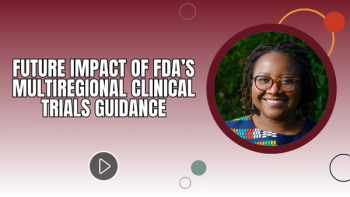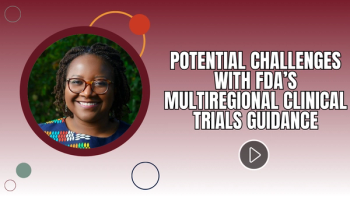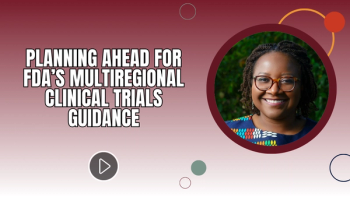
FDA
Latest News

Latest Videos

More News

Despite the setback with the Oncologic Drugs Advisory Committee vote, GSK emphasizes the unmet need in multiple myeloma and highlights global momentum behind Blenrep combination approvals.

By publishing more than 200 complete response letters, the FDA is offering new visibility into the issues that most often delay drug approvals, including safety concerns, trial design flaws, and manufacturing gaps.

Outdated regulations and inflexible sponsor processes are hampering clinical trial recruitment, but empowering sites with modern, compliant marketing tools could turn the tide.

As clinical research increasingly relies on RWD to enhance trial design and patient insights, tokenization has emerged as a critical solution for securely linking disparate datasets while protecting patient privacy.

Under the new initiative, companies may receive a voucher enabling FDA review to be shortened from the standard 10–12 months to just 1–2 months following final application submission if the drug addresses US national health priorities.

While randomization is required by regulatory bodies, it is up to the sponsor on how to conduct it.

In an article recently published by The New England Journal of Medicine, FDA higher-ups Vinay Prasad, MD, MPH; and Martin A. Makary, MD, MPH, wrote that any new COVID-19 vaccine must now be evaluated in placebo-controlled studies.

Rinvoq (upadacitinib) becomes the first oral JAK inhibitor approved by the FDA for the treatment of giant cell arteritis in adults, following robust data from the Phase III SELECT-GCA trial demonstrating its efficacy in achieving sustained remission and reducing glucocorticoid exposure.

In this video interview, Craig Lipset, co-chair, Decentralized Trials & Research Alliance (DTRA), highlights how recent funding cuts are impacting critical research resources.

In this video interview, Craig Lipset, co-chair, Decentralized Trials & Research Alliance (DTRA), discusses how the current political climate is affecting diversity in clinical research and how diversity action plans may be impacted.

FDA grants Priority Review status to Sanofi's tolebrutinib for the treatment of non-relapsing secondary progressive multiple sclerosis based on positive findings from multiple Phase III trials.

In this video interview, Iddo Peleg, CEO and co-founder at Yonalink, talks innovation in clinical technology and how the FDA can continue to promote its adoption.

In this video interview, Iddo Peleg, CEO and co-founder at Yonalink, shares his thoughts on the current climate of clinical research following NIH funding cuts and the removal of FDA diversity guidelines.

In this video interview, Vera Pomerantseva, director of product management, RBQM, eClinical Solutions, talks FDA’s latest protocol deviation guidance and potential changes to the draft.

In this video interview, Vera Pomerantseva, director of product management, RBQM, eClinical Solutions, highlights FDA’s recent protocol deviations guidance and how it reinforces previous recommendations from industry.

In this video interview, Pomerantseva, director of product management, RBQM, eClinical Solutions, discusses the new guidance and its level of detail on the different types of protocol deviations.

In an interview with ACT senior editor Andy Studna at SCOPE Summit, Rajneesh Patil, vice president, digital innovation, IQVIA, highlights the impact of artificial intelligence/machine learning in improving outcomes and maintaining safety with its implementation.

Recent actions by the FDA and NIH in response to the current political climate have left key stakeholders in clinical trials with limited resources to conduct equitable research.

Study finds the typical cost of clinical research for developing new drugs is lower than previously estimated, with median costs providing a more accurate reflection than mean costs.

In this video interview, Rachael Fones, director, government & public affairs, IQVIA, discusses the importance of goal setting in the context of FDA’s latest Diversity Action Plan guidance.

Industry leaders share their perspectives on the guidance and how it will affect sponsors moving forward.

In this video interview with ACT editor Andy Studna, Mwango Kashoki, SVP, global head of regulatory strategy, Parexel, discusses how the guidance should prompt better-designed oncology trials and greater diversity.

In this video interview with ACT editor Andy Studna, Mwango Kashoki, SVP, global head of regulatory strategy, Parexel, touches on challenges that may be created by the guidance such as meeting multiple regulatory requirements.

In this video interview with ACT editor Andy Studna, Mwango Kashoki, SVP, global head of regulatory strategy, Parexel, discusses how sponsors will need to plan ahead even further for their oncology trials.

In this video interview with ACT editor Andy Studna, Mwango Kashoki, SVP, global head of regulatory strategy, Parexel, highlights how FDA’s multiregional clinical trials in oncology guidance encourages more diverse site locations and patient populations.












